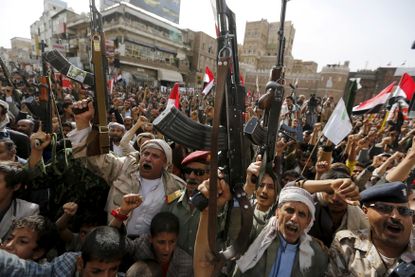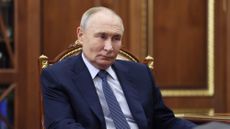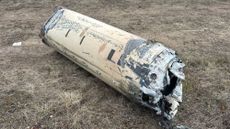Why you should be freaking out about the disastrous war in Yemen
Saudi Arabia is laying waste to a country — and al Qaeda is moving in


The ongoing atrocity that is the war in Yemen finally got a bit of mild international attention with the haunting picture of a starving 5-month-old Yemeni baby, Udai Faisal, staring at the camera with an expression of mute horror, his papery skin stretched tight over jutting bones. He died a couple of days later.
But death by malnutrition and sickness, largely caused by Saudi Arabia's blockade, is only one of many ways the war is landing on Yemeni kids. According to Unicef, fighting has killed or maimed at least six children every day for the last year, and probably many more. Overall, some 8,100 people have died, tens of thousands have been injured, and 2.5 million displaced.
The war has now been waged for over a year, and the United States is deeply implicated through its support of Saudi Arabia. Yet a few exceptions aside (such as The American Conservative's Daniel Larison), there has been vanishingly little attention paid to the conflict in the U.S. media. America would be well advised to start using its influence to restore peace and end the Saudi blockade.
Subscribe to The Week
Escape your echo chamber. Get the facts behind the news, plus analysis from multiple perspectives.

Sign up for The Week's Free Newsletters
From our morning news briefing to a weekly Good News Newsletter, get the best of The Week delivered directly to your inbox.
From our morning news briefing to a weekly Good News Newsletter, get the best of The Week delivered directly to your inbox.
First, a bit of background. The Yemeni government has long had trouble with the group Ansar Allah, a Shia group based in the north of Yemen, also called the Houthis. The Arab Spring toppled the sitting president in 2011, after which the sitting vice-president, Abd Rabbuh Mansur Hadi (Sunni), was elected on a single-candidate ballot as an interim president. Long story short, the Houthis boycotted the election, the former president Ali Saleh (Shia) threw in with them, and a ceasefire broke down in early 2015, leading to open war. The Houthis took over the capital Sana'a, and attempted to take the southwest port city of Aden, the last remaining major bastion of the previous government.
Fearing a fully Shia-run state on their southern border and wanting to smash a proxy of Iran (which is also the most powerful Shia state), the Saudis jumped in on Hadi's side.
After months of fighting, Hadi's forces managed to push the Houthis out of Aden and the surrounding towns. However, despite a Saudi blockade and brutal bombing campaign (which has annihilated many civilian targets, including schools, hospitals, refugee camps, and three Doctors Without Borders operations), they have made virtually no progress in re-taking the rest of the country. The Houthis are still firmly in control of the capital Sana'a, along with most of the country's northwest — which they have brutalized in their own way, reportedly recruiting child soldiers and imposing a grim internal blockade on the city of Taiz.
Naturally, the only party which has come out unquestionably ahead from the conflict is al Qaeda, which has seized vast swathes of the eastern hinterlands where it operates with near-impunity. They even made some inroads in Aden itself — a stark demonstration of the Hadi government's weakness.
The Saudis have insisted this is a proxy war between them and Iran, but the reality is that Iran has only been tangentially involved. The Iranians tried to head off the Houthi rebellion (fearing it would jeopardize the nuclear deal with the U.S.), and while they may have since sent over a few weapons shipments, it's not remotely close in scale to the massive campaign the Saudis have undertaken. This is Saudi Arabia throwing its weight around in an attempt to ensure it has a pliant client state on its southern border.
The U.S. has been a massive help to the Saudis, helping lock in international support and selling them gobs of weapons. The Obama administration is probably attempting to make up with the Saudis after the nuclear deal with Iran, which greatly upset them, by letting them have their war without too much fuss. Despite the U.S.-Saudi alliance making less sense by the day, they're too locked into the Washington foreign policy establishment for it to be cast aside.
However, a ceasefire is scheduled to take effect on April 10, in preparation for peace talks to begin in Kuwait a week later. This would be a perfect time to bring some diplomatic pressure to bear to end the bombing, lift the blockade, and reach some sort of power-sharing arrangement. Saudi Arabia is creating yet another sucking chest wound in the Middle East political order, and al Qaeda is running hog-wild in the ensuing chaos. Let's put a stop to it.
Sign up for Today's Best Articles in your inbox
A free daily email with the biggest news stories of the day – and the best features from TheWeek.com
Ryan Cooper is a national correspondent at TheWeek.com. His work has appeared in the Washington Monthly, The New Republic, and the Washington Post.
-
 What is Mitch McConnell's legacy?
What is Mitch McConnell's legacy?Talking Point Moving on after a record-setting run as Senate GOP leader
By Joel Mathis, The Week US Published
-
 'A man's sense of himself is often tied to having a traditionally masculine, physical job'
'A man's sense of himself is often tied to having a traditionally masculine, physical job'Instant Opinion Opinion, comment and editorials of the day
By Justin Klawans, The Week US Published
-
 7 festive hotels that get decked out for the holidays
7 festive hotels that get decked out for the holidaysThe Week Recommends These properties shimmer and shine all December long
By Catherine Garcia, The Week US Published
-
 Romania's election rerun
Romania's election rerunThe Explainer Shock result of presidential election has been annulled following allegations of Russian interference
By Sorcha Bradley, The Week UK Published
-
 Russia's shadow war in Europe
Russia's shadow war in EuropeTalking Point Steering clear of open conflict, Moscow is slowly ratcheting up the pressure on Nato rivals to see what it can get away with.
By The Week UK Published
-
 Cutting cables: the war being waged under the sea
Cutting cables: the war being waged under the seaIn the Spotlight Two undersea cables were cut in the Baltic sea, sparking concern for the global network
By The Week UK Published
-
 The nuclear threat: is Vladimir Putin bluffing?
The nuclear threat: is Vladimir Putin bluffing?Talking Point Kremlin's newest ballistic missile has some worried for Nato nations
By The Week UK Published
-
 Russia vows retaliation for Ukrainian missile strikes
Russia vows retaliation for Ukrainian missile strikesSpeed Read Ukraine's forces have been using U.S.-supplied, long-range ATCMS missiles to hit Russia
By Arion McNicoll, The Week UK Published
-
 Has the Taliban banned women from speaking?
Has the Taliban banned women from speaking?Today's Big Question 'Rambling' message about 'bizarre' restriction joins series of recent decrees that amount to silencing of Afghanistan's women
By Harriet Marsden, The Week UK Published
-
 Cuba's energy crisis
Cuba's energy crisisThe Explainer Already beset by a host of issues, the island nation is struggling with nationwide blackouts
By Rebekah Evans, The Week UK Published
-
 Putin's fixation with shamans
Putin's fixation with shamansUnder the Radar Secretive Russian leader, said to be fascinated with occult and pagan rituals, allegedly asked for blessing over nuclear weapons
By Harriet Marsden, The Week UK Published